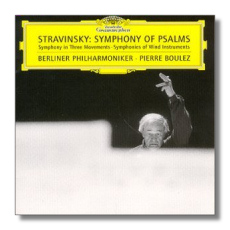
The Internet's Premier Classical Music Source
Related Links
- Stravinsky Reviews
- Latest Reviews
- More Reviews
-
By Composer
-
Collections
DVD & Blu-ray
Books
Concert Reviews
Articles/Interviews
Software
Audio
Search Amazon
Recommended Links
Site News
 CD Review
CD Review
Igor Stravinsky

Symphonies
- Symphonies of Wind Instruments
- Symphony of Psalms
- Symphony in Three Movements
Berlin Radio Chorus
Berlin Philharmonic Orchestra/Pierre Boulez
Deutsche Grammophon 457616-2 DDD 52:04
All three works on this CD are symphonies, but none adhere to the traditional meaning of that word, and all three are very different from each other. Symphonies of Wind Instruments, the earliest work on this disc, was written in memory of Claude Debussy, and it is a symphony – or rather, a series of short symphonies – only in the sense that the winds "sound together" in larger or smaller groups. The music is stark and prehistoric, but not wild like Stravinsky's The Rite of Spring. The musicians seem to be priests carrying out a ancient ceremony that can be only approximately understood today. Boulez leads it with precision, yet he finds more personality in the music than most conductors do. There's even a little dry humor in these forgotten rituals. Kudos to the Berlin wind instruments here.
Stravinsky wrote the Symphony of Psalms in 1930 for Serge Koussevitzky and the Boston Symphony Orchestra, and revised it 18 years later. The chorus sings the Latin psalm texts almost continuously, and so the Symphony of Psalms sounds less like a traditional symphony and more like Orff's Carmina Burana, especially because of the striking choral rhythms found in both works. It probably was not Stravinsky's intention to write a religious work. The composer seems to have distanced himself from the sentiments expressed in favor of reveling in the sound itself, and so perhaps the term "symphony" is not so far off after all. As if to support this interpretation, the Berlin Radio Chorus never lets its tone be coarsened or its timing be impaired by vehement emotions. I like this touch of detachment, which emphasizes the music's "black and white" qualities.
The Symphony in Three Movements, written in 1945, is most like what usually is understand to be a symphony. For me, anyway, it is also the most elusive of these three works, with its unpredictable shifts in mood and – should I say it? – reluctance to seem too sincere. Boulez, ever the suave (but not glib) modernist, reinforces the symphony's strangely disturbing neoclassicism and shows how much this work anticipates what John Adams would do 40 years later.
I prefer these performances to any other that I've heard on disc. Paradoxically, Boulez's coolness and control are very involving, and the more he withdraws from the music, the more that meaning rushes in to fill the vacuum. The Berlin Philharmonic complements Boulez's algebraic detachment with perfection of their own, and the engineering is similarly lean and clean. This is another fine addition to Boulez's DG discography. His new Mahler Fourth will reviewed here shortly, as will a new CD paying tribute to him on his 70th birthday.
Copyright © 2000, Raymond Tuttle


















